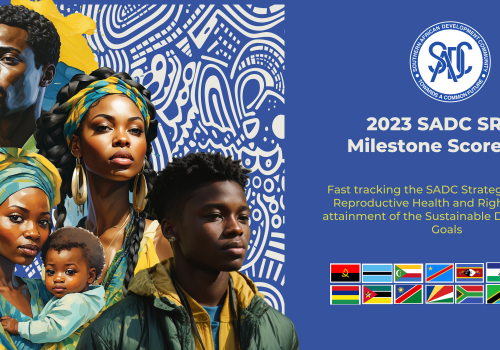SADC Launched its 2nd Milestone Scorecard on Sexual and Reproductive Health and Rights (SRHR) on the margins of the joint meeting of Ministers of Health and Ministers responsible for HIV & AIDS on the 28th of November 2023 in Luanda, Republic of Angola.
The SADC SRHR scorecard is a high-level strategic tool to track progress being made at a political level, to achieving the outcomes of the SRHR Strategy for the SADC Region 2019 – 2030. It uses as its basis, the goals and targets of the SDGs, that are aspirational for Member States to make significant progress in achieving the targets.
It enables cross regional comparisons on progress made, inspires, and allows for the identification and sharing of good practices and thereby ensuring better SRHR outcomes for individuals, families, communities, countries, and the SADC region.
H.E Dr. Silvia Lutucuta, Minister of Health of the Republic of Angola, and Chairperson of the SADC Ministerial Committee on Health graced the occasion, and applauded the Kingdom of Eswatini, Republic of Namibia and Republic of South Africa, who were the SADC Troika Member States at the time, for initiating the development of the SADC SRHR Strategy and Scorecard. She thanked the International Cooperating Partners for their support in developing the scored.
She underscored that the launch of 2nd SADC SRHR Milestone Scorecard provided an opportunity to highlight progress made, barriers, challenges, priorities, and strategies on SRHR in the region and advocated for increased action in protecting, sustaining, and advancing the SRHR gains.
Mrs. Angele Makombo N’tumba, SADC Deputy Executive Secretary for Regional Integration, delivered remarks at the launch and said that the strategy and scorecard is driven by the SADC Vision 2030, which aims for a region in which all people are able to have a healthy sexual and reproductive life, have sustainable access, coverage and quality SRHR services, information and education, and are fully able to realise and exercise their SRH rights, as an integral component of sustainable human development in the SADC Region.
The Deputy Executive Secretary applauded Member States for their commitment in devising strategies and approaches to address maternal and neonatal mortality, promote a multisectoral approach to addressing the scourge of gender-based violence. She emphasized the need to ensure that every woman and every adolescent girl and young woman has access to contraceptives so that they can reach their full potential.
Ms. Lydia Zigomo, Regional Director, UNFPA East and Southern Africa speaking on behalf of the UN Agencies supporting the Together4SRHR programme, highlighted that if the SADC region is to make the progress of ensuring that all people enjoy a healthy sexual and reproductive life, and have sustainable access to quality SRHR services, then there must be support directed at SRHR programmes.
She highlighted five key areas of action required which are.
● Ensuring that SRHR is incorporated into national essential package of services and medicines list, and as part of our Universal Health Coverage (UHC) benefit packages, while ensuring the provision of quality integrated services is part of the Primary Health Care system.
● Promoting open and frank conversations on the impact that legal and policy barriers posed on the SRHR, leading to high unintended pregnancies, unsafe abortion, gender-based violence, and ultimately on new HIV infections, and maternal mortality.
● Building the resilience of our health systems to withstand future pandemics, the impact of climate change, conflicts, and other humanitarian shocks, by ensuring that SRHR is included in national disaster preparedness strategies and plans and the next generation of SRHR strategies and frameworks.
● The recently launched Global Aids Report for 2023 under the theme “Let Communities Lead” Urging us that to further advance SRHR, and that communities must be fully and reliably funded and made central in all SRH policies and programmes so that they can fully lead efforts to advance and protect SRHR.
● Finally, the need to adopt a digital mindset where we leverage advances in digital technologies to enhance the quality of care through client responsive data systems.
The Strategy for Sexual and Reproductive Health and Rights in the SADC Region 2019– 2030 was endorsed by the Ministers of Health and Ministers responsible for HIV & AIDS, in 2018 as a policy and programming framework for SADC Member States to accelerate the attainment of sexual and reproductive health and rights for all people living in the region.

